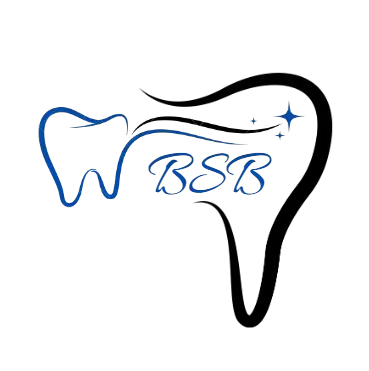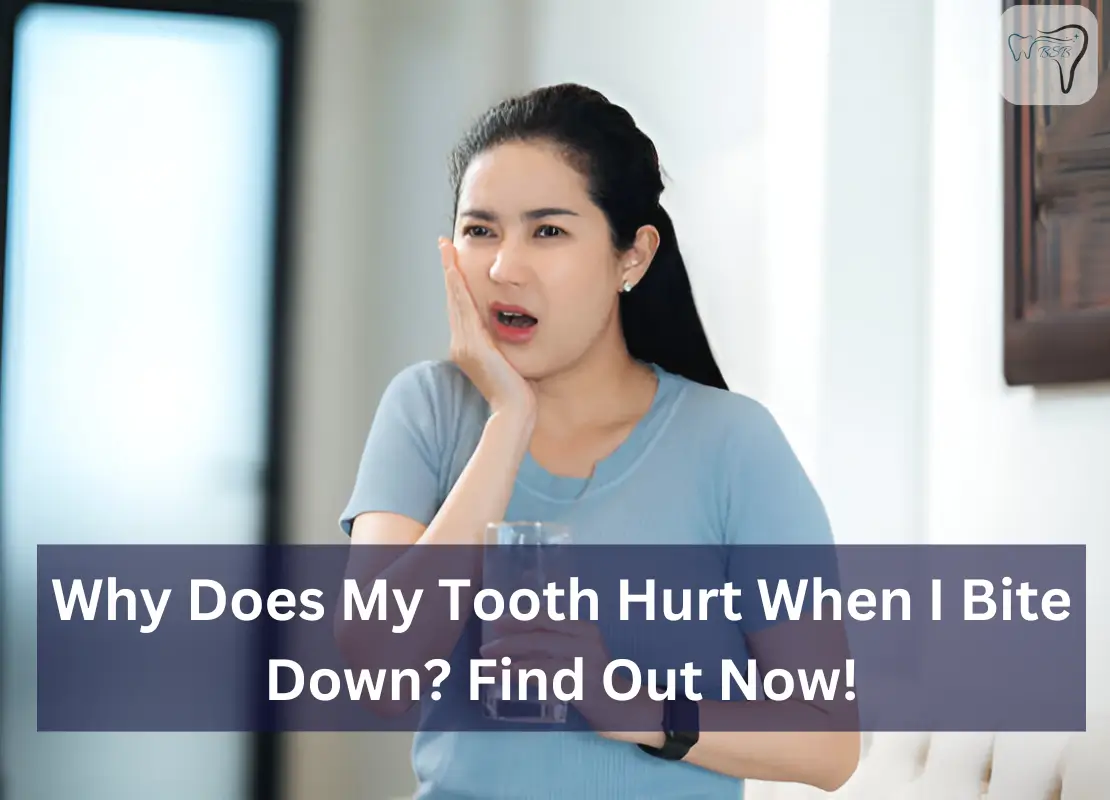When teeth hurt while biting down or chewing, it’s crucial to understand the cause. Your tooth pain might range from dull and achy to sharp and throbbing, often signaling exposed dentin or other dental problems. Our Ottawa dentists regularly treat such oral health issues.
The feeling of sensitivity and discomfort upon touch is a warning sign of underlying conditions requiring treatment. Early intervention ensures better preservation and efficient solving and alleviation of these concerns.
Why Does My Tooth Hurt When I Bite Down? Find Out Now!(Short Answer)
Causes and Treatments for Tooth Pain When Biting or Touching
The Tooth / Crown / High Filling
In my 12 years of dental practice, I’ve noticed that a new filling, crown, or cap at the wrong height often disrupts the natural bite between upper and lower teeth. This misalignment affects pressure distribution, creating excess weight bearing on certain spots. After dental treatment, once the anaesthetic wears off, patients notice discomfort during chewing as opposing teeth make improper contact.
During follow-up visits, I use specialized marking paper for measurement and analysis, allowing precise assessment of occlusal force and mechanics. A quick adjustment restores proper engagement between teeth, bringing immediate relief from that sore feeling that makes eating uncomfortable.
Large Cavity in Tooth
A hole in your enamel creates discomfort when food gets stuck, especially sweets, coffee, pastry, or soda. This strange sensation develops into a toothache with lingering pain during eating and bite. As decay reaches an advanced stage, affecting the pulp and nerve location, you’ll notice sensitive flare-ups upon touch.
The rough edge becomes noticeable, and its extent and development determine the symptoms. During your dentist exam, they’ll evaluate these signs of cavities, enabling prevention of further advancement through proper evaluation. The pressure while trying to chew indicates the need for immediate attention.In addition to sensitivity to touch, other symptoms and signs that you might have a cavity include:
- Sudden discomfort or sensitivity in the teeth
- Throbbing or sharp sensations during eating or drinking hot, cold, or sweet foods
- Noticeable indentations or cavities in your teeth
- Staining or discoloration, ranging from yellow to dark brown spots
Tooth Abscess
When your tooth causes sharp pain during chewing or bite, it might indicate a bacterial infection. An abscess near the root can develop in the bone, causing swelling and pimples on your gums. Look out for a salty drainage, fistulas, or a cyst that responds to pressure. These symptoms often start lingering before worsening. While preservation is our priority, a root canal typically offers the best solution.
Cracked Tooth
As a dentist with 15 years of experience, I’ve seen how tricky a cracked tooth can be to diagnose. When patients report pain while taking a bite or experience a toothache while eating, we often use a stick test to apply pressure at specific points. While dental X-rays might reveal fractured root issues, hairline fractures often remain undetectable.
We employ special testing methods to evaluate sensitive areas, especially when worn enamel or receding gum tissue exposes roots. The nerve center becomes vulnerable to hot, cold, and acidic foods, creating uncomfortable stimuli. While minor cracks often need repair, extensive damage below the line may require removal.
Periodontal Disease
A dental exam reveals if your tooth pain while biting down stems from unhealthy gums. Signs include bleeding, swollen areas, spaces between teeth, tartar build-up, exposed roots, mobility, and sensitive spots. We begin treatment with deep cleaning, including scaling and root planing to remove plaque and calculus. Severe cases of tissue detachment may need flap surgery, which involves lifting gums, or bone grafting to restore proper attachment levels.
Nasal and Sinus Congestion Relief
Surprisingly, that tooth pain when you bite down might not be a dental problem at all. The roots of your teeth sit close to your nasal sinuses, and when these sinuses become inflamed due to nasal congestion or sinus congestion, it can be intensely painful.
In my practice, I’ve noticed this particularly affects the sensitive molars (back teeth) and premolars (bicuspids) – those teeth between your cuspids (eye teeth) and molars. Interestingly, lower teeth rarely experience this discomfort.At-home treatments can help relieve the congestion and the discomfort it causes. Some options include:
⦁ Utilizing a vaporizer
⦁ Placing a warm towel on the affected area
⦁ Enjoying a hot, steamy bath
⦁ Using a nasal rinse or mist
Gum Recession and Tooth Sensitivity
That sharp pain while eating, drinking, or chewing might signal gingival recession, where your gum pulls back to leave the root surface exposed. From my clinical experience, this sensitive area responds intensely to pressure and food contact.
Common culprits include aggressive brushing, trauma, teeth grinding, unusual tooth position, or gum disease. If an infection develops, we typically prescribe an antibiotic, medicated mouthwash, or gel for treatment. In severe cases, we might recommend flap surgery or a tissue graft to help the gums regrow.
Malocclusion
Malocclusion, or improper alignment between your upper teeth and lower teeth, often causes pain during biting and chewing due to unbalanced pressure. As a dentist, I’ve seen this condition stem from hereditary factors, lost teeth, or ill-fitting restorations.
While examining your bite issues, we consider various treatments – from simple enameloplasty (reshaping) to orthodontia like braces. Sometimes, teeth need to be capped, have a crown replaced, or be removed entirely to restore comfort.
Dental Injury Treatment and Care
A dental injury can occur from an accident or during sports, ranging from mild to severe. As a dental care professional, I’ve seen everything from a bruised tooth to dislodged teeth and knocked out teeth. Often, a cracked tooth isn’t obvious until you bite down and feel sharp pain upon release.
Patients describe various symptoms, like a sensation of something caught between their teeth or discomfort while eating and drinking. Even a seemingly minor chipped tooth needs prompt treatment to prevent complications.
Understanding Wisdom Teeth Pain
When your back teeth hurt as you bite down, your impacted wisdom teeth might be the culprit. These third molars typically emerge between ages 18-24 in the back of mouth near your other molars.
As a dental care professional, I’ve seen countless cases where lack of space or improper alignment causes intense pain. While extracting these troublesome teeth is a common procedure, timing is crucial for optimal recovery.
Pulp necrosis
Having treated countless teeth with nerve issues, I’ve noticed that pulp tissue problems often start subtly. When damage or death of the pulp occurs (pulp necrosis), your tooth doesn’t always scream for attention right away.
In the early stages, you might notice a slight tinge of pain when eating, especially with heat, cold, or sweet foods. From my clinical experience, this sensitivity often indicates trouble brewing inside the tooth that shouldn’t be ignored.
Loose filling or crown
That nagging pain when you bite down might be a loose filling or crown. When these restorations aren’t snug, bacteria can creep beneath them and irritate your tooth. Once they reach the nerve, quick treatment becomes crucial to prevent further complications.
Don’t Ignore Dental Injury Symptoms
Unlike body aches that improve with rest or over-the-counter pain reliever, tooth pain and toothaches signal something more serious in your mouth. Whether it’s a single tooth or several teeth that hurt when you bite or chew, these pain symptoms shouldn’t be ignored.
As a dentist with two decades of experience, I’ve seen how quick intervention keeps your smile healthy. I encourage you to schedule exam with our dental team – we’ll find the answers you need and provide the proper care to resolve your discomfort. Ignoring toothache and ear pain on the same side can lead to more severe complications if not treated promptly.
Finding Relief at Home
If your dentist identifies tooth sensitivity as the source of your discomfort, consider these at-home remedies to ease the pain:
- Your diet plays a crucial role in managing sensitive teeth and pain – start by avoiding irritating foods like hot foods and using a straw for cold beverages. Additionally, limit consumption of acidic foods, citrus fruits, carbonated drinks, and wine in moderation to protect your enamel while still enjoying your favorite beverages.
- Maintain consistent oral hygiene by brushing twice daily with specialized desensitizing toothpaste containing active ingredients like stannous fluoride or potassium nitrate to protect your teeth. Always use a toothbrush with soft bristles and rounded bristles for gentle yet effective cleaning, as these tools are essential for providing relief through at-home treatments.
- Watch out for grinding habits – teeth grinding can significantly worsen tooth discomfort. If you notice this behavior, reach out to your dental care provider about getting a mouth guard, which can prevent fracture and reduce sensitivity while you sleep, offering long-term protection for your dental health.
When to See a Dentist
Don’t wait if your teeth or gums cause pain – this sign could indicate a serious problem. Speak with your dentist promptly when you notice any discomfort, as delayed treatment may worsen the condition, requiring extensive dental work or risk losing your tooth if not addressed quickly.If the pain persists, remember that tooth infection might be spreading to your heart, making it even more urgent to seek care.
Why Dental Injuries Cause Pain When Biting Down
When your tooth hurts during biting, the underlying reason often stems from one of three key issues I’ve frequently encountered in dental practice. The first is hairline fractures that occur when teeth become weak after biting something too hard, or when a large filling becomes loose, leaving the tooth without proper protection.
The second common cause is decay present in the tooth, making it weaker and more susceptible to breakage. These problems typically increase gradually as the tooth sustains more damage, leading to deeper cracks. Speaking from experience treating patients with oral problems in danger of worsening, these issues require immediate attention before the pain intensifies during bites.
What Should You Do About Tooth Pain?
If you’re experiencing persistent tooth pain, don’t think it will resolve on its own – I’ve seen countless patients suffering from worsened conditions due to delay in seeking help. It’s necessary to schedule an appointment with your dentist right away, as they can perform essential procedures to repair any damage before it becomes more serious.
From my professional experience, waiting too long risks damaging the sensitive dental pulp inside your tooth, and in such cases, your dentist might make a referral to an endodontist for specialized treatment.
Got Tooth Pain?
If you’re currently experiencing tooth pain when you bite down, I understand how tempting it can be to put off visiting the dentist – I see patients who avoids treatment all the time. However, it’s crucial to address what might happen to your tooth if you delay care.Die from pulling an infected tooth could be a rare but serious outcome if infection spreads beyond the tooth, making immediate care essential.
We provide special accommodations to make your dental visit comfortable, and our team can perform any repairs you need. Having treated countless patients with similar concerns, I can assure you that early intervention makes all the difference.
Conclusion
Tooth pain while biting down can stem from various causes, such as a misaligned filling, cavities, abscesses, cracked teeth, or gum disease. Early detection and treatment are crucial to prevent worsening conditions and relieve discomfort. Consulting a dentist promptly ensures proper care and effective solutions.

